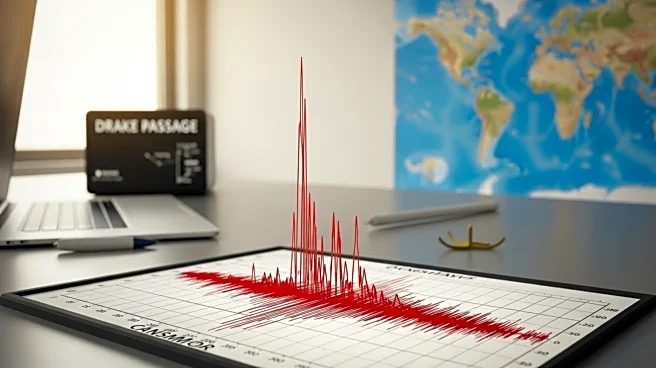What's Happening?
A significant earthquake with a magnitude of 7.8 struck the Drake Passage on Friday, as reported by the U.S. Geological Survey. The epicenter of the quake is located in the remote waters between South America and Antarctica. Due to the isolated nature of the location, there are currently no confirmed reports of damage or casualties. Authorities are actively monitoring the situation for potential tsunamis and aftershocks, and will issue alerts as necessary. This seismic event coincides with another powerful earthquake, measuring 6.7 in magnitude, which occurred off the coast of the Philippines earlier the same day. The Philippines quake triggered a tsunami warning and led to evacuations across several provinces. The Drake Passage is known for its challenging sea conditions, including strong winds and currents, and is a critical area for oceanographic research.
Why It's Important?
The occurrence of a major earthquake in the Drake Passage highlights the seismic activity in this remote region, which lies along the boundary between the Scotia Plate and the Antarctic Plate. While the area is sparsely populated, its geological activity is significant for scientific research, particularly in understanding global ocean circulation and climate patterns. The potential for tsunamis, although currently unconfirmed, poses a risk to nearby coastal regions, emphasizing the need for vigilant monitoring and preparedness. The event underscores the importance of international cooperation in disaster response and the role of scientific agencies in providing timely information to mitigate risks associated with natural disasters.
What's Next?
Authorities will continue to monitor the Drake Passage for any signs of aftershocks or tsunamis. Updates and alerts will be issued as new information becomes available. The scientific community may increase research efforts in the region to better understand the tectonic movements and their implications for global oceanographic and climate studies. Additionally, emergency response teams in nearby regions may remain on high alert to ensure readiness in case of any developments.
Beyond the Headlines
The earthquake in the Drake Passage serves as a reminder of the dynamic nature of Earth's geological processes and the interconnectedness of global ecosystems. The remote location of the quake limits immediate human impact, but it provides valuable data for scientists studying seismic activity and its effects on ocean currents and climate. The event may also prompt discussions on improving international collaboration in monitoring and responding to natural disasters, particularly in remote and challenging environments.









